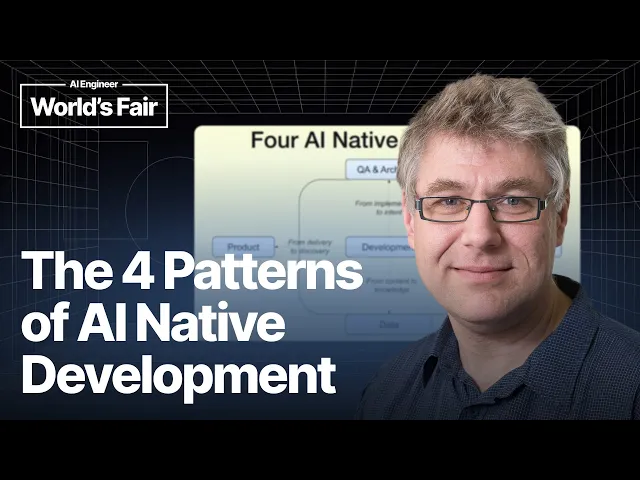The 4 Patterns of AI Native Development

AI native development is changing software engineering
In a recent talk, Patrick Debois outlines a compelling vision for how artificial intelligence is fundamentally reshaping software development practices. While traditional development methodologies have served us well for decades, the integration of AI into the development workflow represents more than just another tool in our arsenal—it's a paradigm shift that's forcing us to rethink foundational assumptions about how software gets built.
Key insights from Debois' presentation:
- AI is enabling a shift from purely deterministic programming to probabilistic systems that can handle uncertainty and generate novel solutions
- Four distinct patterns are emerging in AI-native development: enhanced development, verification, AI assistants, and fully autonomous systems
- The role of developers is evolving toward becoming AI orchestrators who define problems and guide AI solutions rather than writing all code manually
- Traditional software metrics and quality assurance approaches need significant adaptation to account for the probabilistic nature of AI systems
The most profound insight from Debois' talk is the recognition that we're moving from deterministic to probabilistic systems. Traditional programming has always been about defining exact instructions and expected outputs. With AI, we're building systems that deal with uncertainties and can generate unexpected but valuable results. This shift challenges fundamental assumptions about how we develop, test, and maintain software.
This matters because it's not just changing how we build software but what kinds of software we can build. Problems previously considered too complex or nuanced for computation can now be tackled through AI-assisted approaches. For businesses, this represents both opportunity and disruption—the ability to solve previously intractable problems, but also the need to develop entirely new competencies.
Beyond what Debois covered, we're already seeing this transformation play out in real-world settings. Consider GitHub Copilot's impact on developer productivity. Recent studies show that developers using AI assistants complete tasks up to 55% faster than those coding traditionally. However, this comes with new challenges: some organizations report increased technical debt when developers accept AI suggestions without fully understanding the implementation details.
Another interesting dimension is how AI-native development is democratizing software creation. No-code and low-code platforms enhanced by AI are enabling business users to create applications that would have required dedicated development teams in the past. A marketing manager at a mid-sized retail company recently used an AI-assisted platform to build a customer segmentation
Recent Videos
How To Earn MONEY With Images (No Bullsh*t)
Smart earnings from your image collection In today's digital economy, passive income streams have become increasingly accessible to creators with various skill sets. A recent YouTube video cuts through the hype to explore legitimate ways photographers, designers, and even casual smartphone users can monetize their image collections. The strategies outlined don't rely on unrealistic promises or complicated schemes—instead, they focus on established marketplaces with proven revenue potential for image creators. Key Points Stock photography platforms like Shutterstock, Adobe Stock, and Getty Images remain viable income sources when you understand their specific requirements and optimize your submissions accordingly. Specialized marketplaces focusing...
Oct 3, 2025New SHAPE SHIFTING AI Robot Is Freaking People Out
Liquid robots will change everything In the quiet labs of Carnegie Mellon University, scientists have created something that feels plucked from science fiction—a magnetic slime robot that can transform between liquid and solid states, slipping through tight spaces before reassembling on the other side. This technology, showcased in a recent YouTube video, represents a significant leap beyond traditional robotics into a realm where machines mimic not just animal movements, but their fundamental physical properties. While the internet might be buzzing with dystopian concerns about "shape-shifting terminators," the reality offers far more promising applications that could revolutionize medicine, rescue operations, and...
Oct 3, 2025How To Do Homeless AI Tiktok Trend (Tiktok Homeless AI Tutorial)
AI homeless trend raises ethical concerns In an era where social media trends evolve faster than we can comprehend them, TikTok's "homeless AI" trend has sparked both creative engagement and serious ethical questions. The trend, which involves using AI to transform ordinary photos into images depicting homelessness, has rapidly gained traction across the platform, with creators eagerly jumping on board to showcase their digital transformations. While the technical process is relatively straightforward, the implications of digitally "becoming homeless" for entertainment deserve careful consideration. The video tutorial provides a step-by-step guide on creating these AI-generated images, explaining how users can transform...
